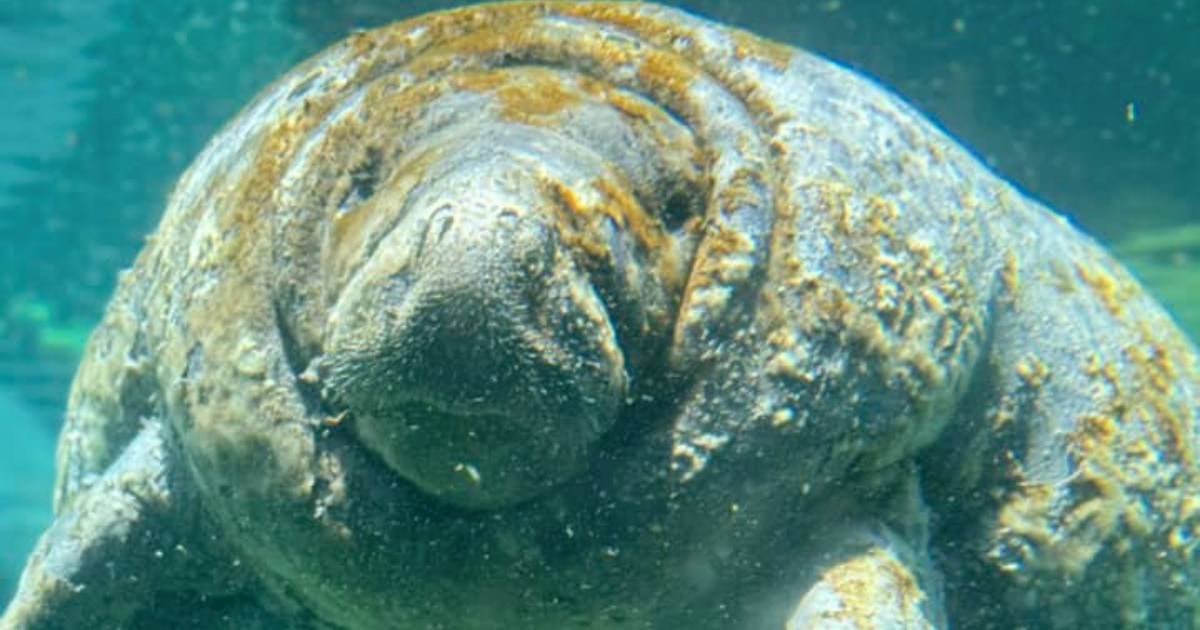A silent environmental catastrophe is endangering one of Florida's most iconic creatures: the manatees. In the Indian River Lagoon, located on the state's eastern coast, pollution from septic tanks and treatment plants is causing an ecological disaster with lethal consequences for this threatened species, according to a report by Local 10.
The discharge of improperly treated wastewater is fueling the rampant growth of toxic algae, which destroys seagrass, the primary food source for manatees. Forced to consume these harmful algae, the animals are poisoned and die slowly, in an excruciating process, as highlighted by Local 10.
"When a manatee starves, its internal organs literally melt and turn to liquid," marine biologists explained to the channel. Among the most heartbreaking discoveries was the skeleton of a mother with her calf still inside, indicating she died while pregnant.
Manatees require up to 100 pounds of vegetation daily to survive, but with the disappearance of seagrass, their only option is to feed on the very algae causing their demise. In response, the environmental group Bear Warriors United filed a lawsuit against Florida's Department of Environmental Protection, and a federal judge ruled in their favor, concluding there is a clear causal link between state sewage regulations and the ecological damage affecting the manatees.
Though solutions such as supplemental feeding programs and halting septic system construction are being discussed, experts warn that ecosystem recovery could take up to 15 years. This case highlights not only the impact of human activity on local wildlife but also the slow institutional response to assume environmental responsibility and protect vulnerable species from regulatory neglect.
Rising Manatee Deaths in Florida: A Grim Outlook
According to a new report from the Marine Mammal Pathobiology Laboratory of the Florida Fish and Wildlife Conservation Commission (FWC), there has been a concerning rise in manatee deaths during the early months of 2025. As reported by local television station WEAR-TV, at least 329 manatees died in Florida between January 1 and April 25.
This figure exceeds the death tolls for the same period in previous years, with 227 deaths in 2024 and 263 in 2023. If this trend continues, 2025 may become one of the worst years for this protected species in the past decade.
The report attributes the fatalities to various causes, including human activities such as boat collisions (36 cases), entrapments in gates or canals (4 cases), and other unspecified anthropogenic factors (4 cases). There were also 46 deaths due to cold stress, a condition that affects manatees when water temperatures drop sharply.
Other natural causes accounted for an additional 28 deaths, while 54 manatees died in the perinatal stage, indicating complications in the early phases of life. Additionally, 135 carcasses were found without undergoing necropsy, preventing the determination of exact causes of death, and 7 were in an advanced state of decomposition.
The analysis includes county-specific details, highlighting cases in Martin, St. Lucie, Palm Beach, Indian River, and Okeechobee, where several manatees died due to collisions, extreme cold, or undetermined causes. This new report underscores the multiple threats these animals face and reinforces experts' calls to strengthen conservation policies and tighten environmental regulations, especially in critical areas like lagoons, rivers, and canals with high human traffic.
FAQs on Florida Manatee Crisis
What is causing the rise in manatee deaths in Florida?
Manatee deaths in Florida are rising due to a combination of factors, including pollution from sewage, toxic algae growth, boat collisions, cold stress, and other human-related activities.
How are sewage regulations affecting manatees?
The discharge of inadequately treated sewage is promoting the growth of toxic algae, which destroys seagrass, the main food source for manatees, leading to starvation and poisoning of these animals.
What legal actions have been taken to protect manatees?
Bear Warriors United filed a lawsuit against Florida's Department of Environmental Protection, resulting in a federal judge ruling that current sewage regulations contribute to ecological harm affecting manatees.
How long might it take for the manatee ecosystem to recover?
Experts estimate that it could take up to 15 years for the manatee ecosystem to recover fully, even with proposed solutions like supplemental feeding programs and stricter regulations.
